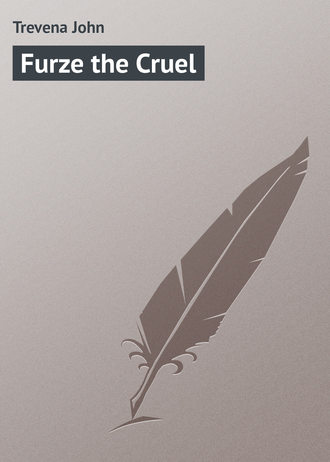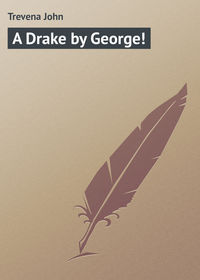 полная версия
полная версияFurze the Cruel
Aubrey loved the little girl. He was steadier than most young men and less fickle than most. Even when he was away from Boodles he did not forget her, and when they were together she absorbed him. She was so fresh. He had never met any girl with a tithe of her wonderful spring-like freshness, which suggested the sweet earth covered with flowers and steaming after a shower of warm rain. Boodles seemed to him to be composed of this warm earth, sunshine and rain, with the beauty and sweetness of the flowers added. She had taken him when young, and planted him in her warm little heart, and tended him so carefully that he could not help growing there; and he could not be torn up, for that would have lacerated the heart; the roots were down so deep; and he might not bear transplanting. First love thinks such things, and it is good for the lovers. Life gives them nothing else to equal it.
Still Aubrey had his troubles. It was the last walk for some time. He was disobeying his parents, and deceiving them. He had promised not to walk with Boodles again. No boy could have been blessed with kinder parents; but Mr. Bellamie, after his strange visit to old Weevil, and subsequent discussion with his wife, conceived that it was his duty to pull the reins. Aubrey had been allowed a free head long enough, and the old gentleman was afraid he might get the bit between his teeth and run. Boodles was a most delightful child in every way, but she knew nothing about art, and what was far more serious she knew nothing of her parents. Mr. Bellamie spoke plainly to his son; reminded him of the duty he owed his family; told him he had been to see Weevil and that the interview had not been satisfactory; mentioned that the old man either knew nothing of the girl's origin, or had certain reasons for withholding his knowledge; explained that to interfere with his son's happiness was his last wish, and that to interfere with the happiness of others was equally distasteful; and concluded by impressing upon Aubrey, what was true enough, namely, that it was not kind to encourage a young girl to fall in love with him when he could not possibly marry her. The boy had been then sufficiently impressed to give the promise which he was now breaking. He felt he could not help himself; he must see Boodles again, and at least tell her that he would never dream of giving her up, but that his parents were inclined to be nasty about it. Besides, it was the little girl's birthday; or rather what Weevil was pleased to style her birthday, as he could not possibly know the exact day of her birth. Aubrey eased his conscience by reminding himself that he had forgotten to urge the point with his father, and if he had done so the old gentleman would certainly have consented to one more meeting. So he bought the pretty ring for Boodles, met her, and the mischief was done again.
When the first stage of their walk was over, and they were getting reasonable, and Boodles had ceased singing her plaintive: "You are going away," Aubrey began to suggest that his father was not in alliance with them; and poor Boodles sighed and wanted to know what evil she had done.
"Nothing, darling. But he wants to know something about your parents."
"I told him. I don't know anything."
"But Weevil must know."
Somehow that had not occurred to Boodles. Perhaps Weevil did know, and for reasons of his own had kept the information from her.
"I'll ask him," she promised. "But Mr. Bellamie has been to see daddy. Why didn't he ask him?"
"Weevil told him he is your grandfather."
"You mean my old daddy-man is my grandfather?" cried Boodles, very much astonished. "Why hasn't he told me then?"
"Hasn't he?"
"Never."
Aubrey was too young to care; but he certainly felt suspicions about Weevil, and thoughtlessly expressed them by saying: "I suppose he was telling the truth."
"Of course he was," said Boodles. "Old daddy couldn't tell a lie however much he wanted to. It would hurt him so badly he would groan and grunt for a week. What else did he tell your father?"
"He didn't say. But, darling, you'll find out."
"Oh, Aubrey," she said pathetically. "Do you care?"
"Lovely little thing, of course I don't. Your parents must have been the best and nicest people that ever lived, or you wouldn't have been so sweet. But you see, darling, my people worry no end about name and family and all that sort of rubbish, and if they think any one is not what they call well-born they kick up no end of a smother."
"Well-born," murmured Boodles. She was beginning to comprehend at last, to recognise the existence of that grim thing called convention, and to feel a sort of misty shadow creeping up the wood. She felt something on one of her fingers, and it seemed to her that the pretty ring, which she loved so much, was trying to work itself off. "Well-born," the child murmured to herself. "Whatever does it mean?"
This was what being eighteen meant. Boodles was learning things.
"I must have had a father and mother," she said, though in a somewhat dubious manner.
Aubrey only hummed something unintelligible, and wished the cloud out of her eyes.
"Now I must find out all about them?"
"I expect my people would like to know, dear," he said.
"If I can't find out, Aubrey?" she went on, in a moist kind of way.
"Then you will have to take mine," he said as lightly as he could.
Boodles stopped, turned away, began to play with a golden frond of bracken almost as bright as her hair, and began to cry as gently as an April shower. She had been on the point of it all the afternoon; and she persuaded herself it was all because Aubrey was going away, although she knew that wasn't true. It was because she was finding out things.
"Don't," she sobbed. "It's doing me good,"
However, Aubrey took her in his arms and tried to pet her, and that did her as much good as anything, although she went on crying.
"Can't give me yours – you silly! They won't be given. They don't want me to love you, they hate me, and your mother kissed me – she did – on my mouth."
"Mother is very fond of you, darling. She is really," Aubrey whispered as quickly as he could. "She said you were perfect, and father agreed with her, and said you would be all that a girl could be, if – if – "
"Go on," murmured Boodles. "It won't hurt. I've got hold of you. I'm taking all the starch out of your collar."
"Never mind what he said."
"We don't say good-bye until you have told me. I'll hang on to you. Stop you, perhaps. Oh, Aubrey, you are going away – that's why I'm crying. Your father said I should be a nice little girl, if – go on."
"If you had a name," said Aubrey, with an effort.
Boodles let him go and stepped back. She looked rather nice, with her eyes in the rain, and her head in the sunshine.
"What does that mean, Aubrey?" she said, almost fiercely.
"Nothing whatever to me, darling. Don't be silly," he said tenderly. "It's only father's nonsense. He thinks so much of his name because it's a fossilised old concern which has been in the county since Noah. He doesn't want me to marry you, only because he's afraid your people may not have lived about here since Noah. If you went and told him you're a Raleigh or a Cruwys he would lay his pedigree at your feet and ask you to roll on it."
"Not well-born. No name," said Boodles, aloud this time. "I think we have been silly babies. I seem to have grown up all at once. Oh, Aubrey, was it you and I who used to walk here – years ago?"
He bent and took her face between his hands and kissed the pretty head.
"We never bothered about names," sobbed Boodles.
"We are not bothering now – at least I'm not. It's all the same to me, darling."
"It's not. It can't be. How silly I was not to see it before. If your parents say I'm not – not your equal, you mustn't love me any more. You must go away and forget me. But what am I to do? I can't forget you," she said. "It's not like living in a town, where you see people always passing – living as I do, on the moor, alone with a poor old man who imagines horrors."
"Listen, darling." Aubrey was only a boy, and he was nearly crying too. "I'm not going to give you up. I'll tell you the whole truth. My people wanted me not to see you again, but I shall tell them that things have gone too far with us. They won't like it at first, but they must get to like it. I shall write to you every week while I am away, and when I come back I shall tell father we must be married."
"I wouldn't, not without his consent. I shall go on loving you because I cannot help it, but I won't marry you unless he tells me I may."
"Well, I will make him," said Aubrey. "I know how to appeal to him. I shall tell him I have loved you ever since you were a child, and we were promised to each other then, and we have renewed the promise nearly every year since."
"Then he will say you were wicked to make love to the first little red-headed girl you could find, and he will call me names for encouraging you, and then the whole world will explode, and there will be nothing left but lumps of rock and little bits of me," said Boodles, mopping her eyes with his handkerchief. She was getting more cheerful. She knew that Aubrey loved her, and as for her name perhaps it was not such a bad one after all. At all events it was not yet time for the big explosion. "I'm only crying because you are going away," she declared, and this time she decided she meant it. "What a joke it would be if I turned out something great. I would go to Mr. Bellamie and ask him for his pedigree, and turn up my nose when I saw it, and say I was very sorry, but I must really look for something better than his son, though he has got a girl's face and is much prettier than I am. Oh, Aubrey," she cried, with a sudden new passion. "You have always meant it? You will be true to your little maid of the radiant head? I don't doubt you, but love is another of the queer puzzles, all flaming one time, all dead another, and only a little white dust to show for all the flame. The dust may mean a burnt-out heart, and I think that is what would happen if you gave me up."
He satisfied her in the usual way, declaring that if they ever were separated it would be by her action, not by his. She would have to unfasten the lover's knot. Then they went on. It was getting late, and the short day was already in the dimsies. They stood beside the gate, saying good-bye, not in two words, but in the old method which never grows musty. They passed on, the gate slammed, and they were outside; only just outside, but already they were lost and could not have found their way back; for the wand of the magician had been waved over "our walk," and fairyland had gone away like smoke to the place where babies come from.
Weevil was sitting in the dark, mumbling and moaning, when Boodles came in. He was in the seventh Hell of misery, as he had been for a walk and discovered beneath a hedge a rusty iron trap with its jaws fastened upon the leg of a rabbit. The creature had been caught days before, as decomposition had set in, and as it was only just held by one leg it must have suffered considerably. Such a sight is quite one of the common objects of the country, therefore Weevil ought not to have been perturbed; only in his case familiarity failed to breed indifference. He sat down in the dark, and as soon as the child entered began to quaver his usual grievance: "What right have they to make me suffer? Why may I not go a walk without being tortured? What right have the brutes to torment me so?"
"Groaning and grunting again, poor old man," said Boodles cheerfully, rather glad there was no light, as she did not want him to see she had been crying. "You must laugh and be funny now, please, for I've come home dreadful tired, and if you go on worrying I shall begin to groan and grunt too. I'm ready to have my boots taken off."
"Don't talk like that. Your throat sounds all lumpy," the old man complained, getting up and groping towards her in the dark. "What have you been doing – quarrelling?"
Boodles made noises which were intended to express ridicule, and then said miserably: "Saying good-bye."
Weevil knelt upon the carpet and began to unlace the first boot he could find, groaning and grunting again like a professional mourner.
"Did it hurt, Boodle-oodle?" he asked tenderly.
"Horrid," she sighed.
"It made you cry?"
"Ees."
"That was the Brute, darling. I've warned you of him so often. He doesn't let any of us escape. He shows me rabbits in traps, and he makes you cry. I believe you are crying now."
"Not much, daddy. Only a few little tears that were late for the big weep," said Boodles, burrowing her face into a cool cushion.
"I want you to laugh. You don't laugh so much now," he complained, drawing the boot off carefully, and then feeling inside to make sure that the foot had not come away too.
"One day you said I laughed too much, and I wasn't to do it any more," said a doleful voice.
"Ah, but there was a reason for that," said the old man cunningly. "I thought the Brute would be angry if he saw you laughing so much. That was before I took him by the throat and flung him out of the house. He hasn't been here since – not to worry you anyhow," he chuckled.
"You must explain that, please, and a lot of other things besides," she said hurriedly, sitting up and trying to locate the exact position of his head.
Old Weevil laughed in a silly sort of way. "It's a little personal matter between the Brute and me," he chuckled.
"But I come in. I'm the respondent, or whatever you call it. Now I must hear all about it," she said.
"You're not old enough. I shan't tell you anything until you are twenty-one."
"Yes, you will. I'm not a baby now. I am eighteen, and I feel more – nearly eighty-one to-night. I've got one boot on still, and if you won't answer I'll kick."
The old man jumped playfully upon the threatening foot like a kitten upon a ball of wool.
"Daddy-man, I'm serious. I'm not laughing a bit. I believe there is another cry coming on, and that will make you groan and grunt dreadful. Is it true you are my grandfather?"
The question was out with a rush, and murmuring: "There, I've done it," Boodles put her face back into the cushion, breathing as quickly as any agitated maid who has just received an unexpected offer of marriage.
Whatever Weevil was doing she could not think. He appeared to be scrabbling about the floor, playing with her foot. Both of them were glad it was so dark.
"Who told you that?" he said.
"Aubrey. You told his father. Why haven't you ever told me?"
"Boodle-oodle," he quavered, "let me take your other boot off."
"The boot can wait. Don't be unkind, daddy," she pleaded. "I've been worried dreadful to-day. Why did you tell Mr. Bellamie you are my grandfather, if you're not?"
"I am," cried old Weevil. "Of course I am. I have been your grandfather for a long time, ever since you were born, but I wasn't going to tell you until you were twenty-one."
"Why not? Why ever shouldn't I know? Are you ashamed of me?"
At that the old man began to throw himself about and make horrible faces in the dark.
"I expect you are," Boodles went on. "Mr. Bellamie is ashamed of me. He says I'm not well-born, and I have no name. Aubrey told me this afternoon."
"The liar," cried old Weevil. Then he began to cackle in his own grotesque way. He couldn't help being amused at the idea that he should be calling Mr. Bellamie a liar. "How did he know? How did he find that out?" he muttered. "Nobody could have told him. He must have guessed it."
"You are my grandfather," Boodles murmured. "Now you must tell me all about my father and mother. I've got to let Mr. Bellamie know," she went on innocently.
"I told him. I told him the whole story," cried Weevil. "He sat in this room for an hour, and I gave him the whole history. What a forgetful man he must be. I will write it out and send it him."
"Tell me," said Boodles. "How could you say that you picked me up on your doorstep, and never knew where I had come from?"
"It's a long story, my darling. I don't fancy I can remember it now." The old man wondered where he had put that precious piece of paper.
"Don't squeeze my foot so. Who was my mother? Do you really know who my mother was?"
"Tita, we called her that for short, Katherine, Mary – no, that's you. I've got it all written down somewhere. I must tell her the same story. Shall I light the lamp and find it?"
"You must remember. Are you my mother's father?" she asked impatiently.
"Wait a moment, Boodle-oodle. These sudden questions confuse me so. Mr. Bellamie would know. I told him. Yes, it was your mother. Miss Lascelles was her name, and I married her in Switzerland. We stayed at that hotel where Gubbings wrote his history of the world, and we fell out of a boat on Lake Geneva, and she was never heard of again."
"Where was I?" cried Boodles, knowing that impatience would only perplex him more.
"You were not born, darling. It was a long time after that when you were born, and your father was Canon Lascelles of Hendon."
"Dear old man, don't be so agitated," she said, putting out a hand to stroke his whiskers. "You are so puzzled you don't know what you are saying. How could my mother be drowned before I was born?"
"No, no, darling, you misunderstand me. It was my wife who disappeared mysteriously, not your mother."
"My mother was your daughter. That's one thing I want to know," said perplexed Boodles.
"Tita, we called her Tita for short," he said, glad of one fact of which he was certain.
"And my father, Canon Lascelles – really? A real canon, a man with a sort of title?" she cried, with a little joyous gasp.
"He's in British Honduras. I think that was the place – "
"Alive! My father alive!" cried Boodles. "And you never told me before! Why haven't I seen him? Why doesn't he write to me? Oh, I think you have been cruel to me, telling me those wild stories of how I came to you, keeping the truth from me all these years."
Old Weevil sat at her feet, not knowing whether to laugh or cry. He was protecting Boodles, giving her happiness, he thought; but when he heard that cry it suggested to him that his false story might bring her in the end more sorrow than the truth. He could not go back now that he had gone so far. A lie is a rapid breeder of lies; and old Weevil, with his lack of memory, and natural instinct for the truth, was a man singularly ill-fitted for fictions. He had overlooked a great many things in his wild desire to make the child happy. It had never occurred to him that she would feel a natural love for her parents.
"I wanted to be kind to you, Boodles," he quavered. "I kept the truth from you because there were good reasons."
"What were they?"
"I can't tell you, darling," he answered truly. "You must not ask me," he said firmly, because she had touched upon a mystery which his inventive faculties were quite incapable of solving.
"And my mother – where is she?"
"Oh, she is dead," said Weevil cheerfully. He was not going to have any trouble with the mother, and he was sorry he had not killed the father too. "I told you she was drowned mysteriously."
"That was your wife, my grandmother. You are not playing with me? You are not deceiving me?" said Boodles pitifully.
"I'm trying to tell you, only it is all mixed up. It happened so long ago, and the Brute has worried me so much since that I don't seem able to remember anything very clearly. Your mother went out of the hotel one day, and never came back."
"Where?"
"Lausanne, the hotel where – "
"But she may be alive still," interrupted the child.
"Oh no, darling. Quite impossible. She was never heard of again, and it was nearly thirty years ago."
"Don't ramble. You are wandering off again. How could it be thirty years ago, when I'm only just eighteen?"
Weevil admitted the difficulty, and replied that he had been thinking just then of his wife. She would keep mixing herself up with the girl's mother.
"Now I'm getting at it," said Boodles, with a kind of fierce seriousness. "My mother is supposed to be dead. My father is in British Honduras – "
"British Guiana," corrected Weevil.
"Are you sure?"
"Almost certain. I looked it up on the map. I wish I had that piece of paper," the poor old man muttered.
"Well, it does not matter much for the present. You say my mother was Miss Lascelles, and my father was Canon Lascelles; but if my mother was your daughter her name would have been Weevil."
"So it was, my dear," he cried, with a new inspiration, "at least it would have been if – if – I mean, darling, my name is really Lascelles, only I changed it to Weevil when I lost my fortune."
"Why ever couldn't you have told me all this before? How is it that Canon Lascelles had the same name as you? Was he a relation?"
"Yes, darling, first cousin," he faltered, wondering if the story resembled that which he had told to Mr. Bellamie.
"So my name is really Lascelles?"
"Titania Lascelles. But there are a lot of others. I was nearly forgetting them. You have a whole string of names, but I can't remember them now, except Katherine and Mary – ah, yes, and there was Fitzalan. I never could understand why they called you Fitzalan. I've got them all written down somewhere, and I'll read them to you presently. We called you Tita after your mother, but I got into the way of calling you Boodles, which means beautiful, and have never got out of it."
"You told all this to Mr. Bellamie?" asked Boodles excitedly.
"I think so. I tried to," said Weevil hopefully.
"Then what does he mean by saying I am of low birth and have no name?" she cried indignantly.
"Perhaps he did not understand. Perhaps he hadn't grasped it. I tell a story very badly, dear."
That point could not be disputed, and the child seized upon it eagerly. There was no telling what wild rambling statements her grandfather might have poured into the ears of Aubrey's father. But she could tell him now she was quite a well-born little dame, and had a splendid name which was all her own, and she was really good enough for Aubrey after all. She put her head back upon the cushion and began to laugh because she was happy, the day was ending nicely, and she believed the story would end nicely too. She had cried because Aubrey was going away and for no other reason; at one time that afternoon she had not been sure of it, she had almost been afraid that the tears had been brought on by Mr. Bellamie's evil suggestions about her birth; but now she knew that she could hold up her nose with the best of them. She was accustomed to Weevil's eccentric language, his contradictions gave her no suspicions; she swallowed the rambling story whole and wanted more. There were so many questions to be asked and answered. She thought she would write to Aubrey and sign herself Titania Lascelles with great flourishes.
"I am glad to hear you laughing, Boodles," said Weevil tenderly.
The poor old man was far from the laughing mood. He was indeed getting frightened at what he had done, and was wondering how he could carry it on, and how the story would end. Left to himself he would not have told the child anything; but she had caught him in an unguarded moment with a direct question, and he had been forced to answer without time to prepare himself by another rehearsal in private. He had hardly expected her to take things so seriously, forgetting how much the story meant to her, so utterly obsessed was his mind with the one great idea, which was her preservation from the Brute. Love blinds every one. The young it dazzles, like the sun low down on the horizon, so that they see no faults. Into the eyes of the old it flings dust to prevent them from seeing the end of the road.
"Now we must light the lamp and have supper," he said drearily, gently removing the child's other boot and pressing her warm little foot in his cold loving hand.
"I don't want lamps or suppers," she sighed. "What is that light, over in the corner?"
"I think it is the moon shining in between the curtains."
"The wind has got up. It's howling. I don't care, for I've got a name. I'm not Boodles Blank any more. I'm tired and happy."
"I have given you a little happiness. Boodles?" he quavered.
"Heavensfull. You have always been a funny old daddy-man, and now that you are my grand-daddy-man you are funnier than ever. Fancy keeping me in the dark all the time! To-morrow you must tell me everything. What was my mother like? Go on. Tell me a lot about my mother."





